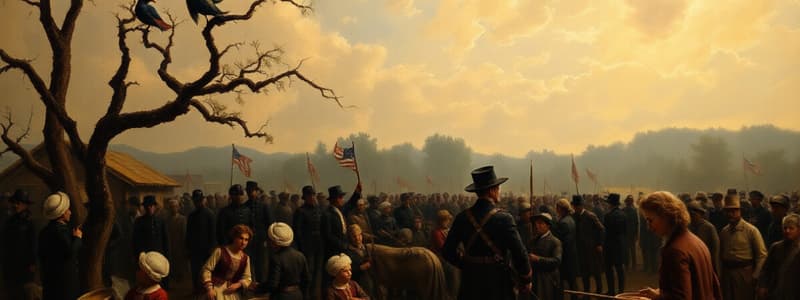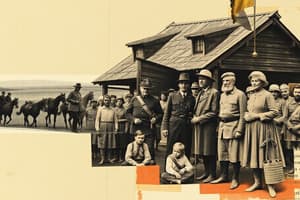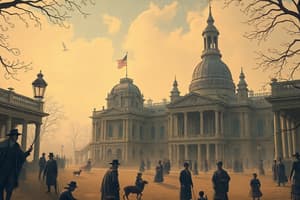Podcast
Questions and Answers
What was the primary aim of Sherman's March to the Sea?
What was the primary aim of Sherman's March to the Sea?
- To establish new territories for the Union.
- To protect Southern cities from Union forces.
- To cripple the South's war effort through total war. (correct)
- To promote peace negotiations between the North and South.
Which amendment abolished slavery nationwide?
Which amendment abolished slavery nationwide?
- The 15th Amendment
- The 13th Amendment (correct)
- The 12th Amendment
- The 10th Amendment
What impact did the Civil War have on the economic landscape of the South?
What impact did the Civil War have on the economic landscape of the South?
- It led to positive industrial growth.
- It caused a catastrophic decline in its agrarian economy. (correct)
- It strengthened the cotton trade.
- It remained unaffected by the war.
What was one of the major social consequences of the Civil War?
What was one of the major social consequences of the Civil War?
What was one significant result of the Civil War concerning federal authority?
What was one significant result of the Civil War concerning federal authority?
What was a major disagreement that contributed to the Civil War?
What was a major disagreement that contributed to the Civil War?
Which economic difference fueled tensions between the North and the South?
Which economic difference fueled tensions between the North and the South?
What was the most fundamental cause of the Civil War?
What was the most fundamental cause of the Civil War?
Which event marked the beginning of the Civil War?
Which event marked the beginning of the Civil War?
What significant political event occurred in 1860 that escalated tensions?
What significant political event occurred in 1860 that escalated tensions?
Which battle is considered a pivotal turning point for the Union?
Which battle is considered a pivotal turning point for the Union?
What did the Emancipation Proclamation achieve?
What did the Emancipation Proclamation achieve?
What did the Siege of Vicksburg accomplish for the Union?
What did the Siege of Vicksburg accomplish for the Union?
Flashcards
Sherman's March to the Sea
Sherman's March to the Sea
A devastating campaign during the Civil War that destroyed Southern infrastructure in Georgia and the Carolinas.
Civil War's impact on the South
Civil War's impact on the South
The war devastated the South's agrarian economy, and reconstruction was slow and costly.
13th Amendment
13th Amendment
Abolished slavery in the United States nationally.
Lincoln's role in the Civil War
Lincoln's role in the Civil War
Signup and view all the flashcards
Federal authority after the war
Federal authority after the war
Signup and view all the flashcards
Causes of the Civil War
Causes of the Civil War
Signup and view all the flashcards
States' Rights vs. Federal Authority
States' Rights vs. Federal Authority
Signup and view all the flashcards
Economic Differences (North vs. South)
Economic Differences (North vs. South)
Signup and view all the flashcards
Slavery Debate
Slavery Debate
Signup and view all the flashcards
Battle of Fort Sumter
Battle of Fort Sumter
Signup and view all the flashcards
Battle of Gettysburg
Battle of Gettysburg
Signup and view all the flashcards
Siege of Vicksburg
Siege of Vicksburg
Signup and view all the flashcards
Emancipation Proclamation
Emancipation Proclamation
Signup and view all the flashcards
Study Notes
Causes of the Civil War
- Disagreements over states' rights and federal authority were a major contributing factor. Southern states believed that they had the right to nullify federal laws they deemed unconstitutional, while the federal government maintained its authority over all states.
- Economic differences between the North and South fueled tensions. The North's industrial economy contrasted sharply with the South's agrarian economy, which relied heavily on enslaved labor. This led to disputes over tariffs, infrastructure development, and economic policies.
- The issue of slavery was the most fundamental cause of the conflict. The expansion of slavery into new territories ignited intense debate and divided the nation. Abolitionist movements in the North gained momentum, while Southern states fiercely defended their right to maintain the institution of slavery.
- Political polarization became increasingly evident. Differing views on the role of government, the balance of power between the states and federal government, and the future of slavery created deep divisions in the political landscape. Political parties fractured along sectional lines.
- Specific events, like the Fugitive Slave Act and the Kansas-Nebraska Act, inflamed passions and further aggravated existing tensions. These events highlighted the deep-seated differences between the North and South.
- The election of Abraham Lincoln in 1860, a Republican opposed to the expansion of slavery, was a crucial turning point. Southern states reacted by seceding from the Union, ultimately leading to the outbreak of war.
Key Battles and Events
- The Battle of Fort Sumter, in 1861, marked the beginning of the Civil War. Confederate forces attacked the Union fort in South Carolina, prompting the mobilization of both sides.
- The Battle of Gettysburg (1863) was a pivotal turning point in the war and a major Union victory. It significantly weakened the Confederate forces and marked a shift in momentum.
- The Siege of Vicksburg (1863) was another crucial Union victory that gave them control of the Mississippi River, splitting the Confederacy in two.
- The Emancipation Proclamation (1863) by President Lincoln declared slaves in Confederate-held territories free. This radical shift redefined the purpose of the war and changed the course of history. It also attracted European support for the Union cause.
- Sherman's March to the Sea (1864-65) was a devastating campaign of total war through Georgia and the Carolinas, aimed at crippling the South's war effort.
Key figures
- Abraham Lincoln, the 16th President of the United States, led the Union throughout the war and played a critical role in preserving the nation.
- Jefferson Davis, the President of the Confederate States of America, led the Confederacy during the war.
- Ulysses S. Grant, a Union general, ultimately led the Union to victory.
- Robert E. Lee, a Confederate general, was a brilliant tactician.
Social and Economic Impact
- The war had profound social consequences, leading to a significant loss of life and displacement of people. Families were fractured, and communities were forever changed.
- The war also had a profound and immense impact on the economies of both the North and South. The North experienced industrial growth, while the South's agrarian economy was devastated and reconstruction efforts were slow and costly.
- The Civil War was a traumatic experience for the nation, resulting in profound and lasting social and political adjustments. It ushered in significant changes in the structure of American society including the abolition of slavery.
Aftermath
- The Civil War resulted in the preservation of the Union.
- Slavery was abolished nationwide via the 13th Amendment.
- The war led to increased federal authority.
- The reconstruction period that followed was fraught with challenges and often violent resistance from the South to federal laws and policies.
Key Impacts
- The war profoundly reshaped the political and social landscape of the United States.
- It fostered a significant loss of life and created a deep divide.
- It brought significant economic hardship and social disruption to the South.
- The war marked a turning point in American history.
Studying That Suits You
Use AI to generate personalized quizzes and flashcards to suit your learning preferences.



